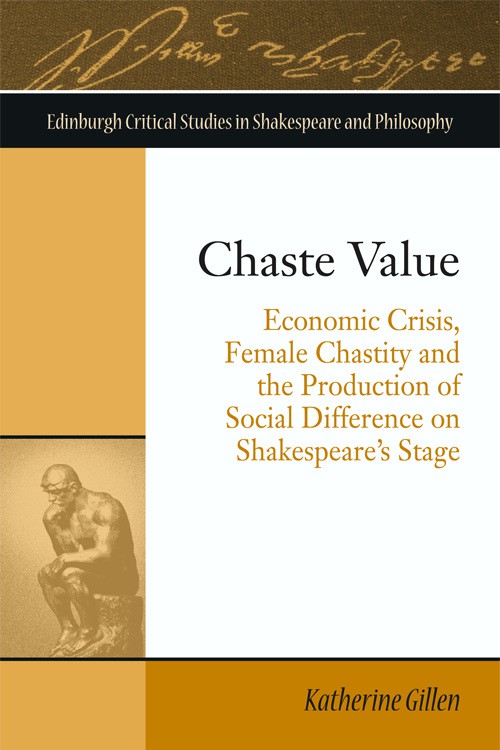
By Katherine Gillen
Interest in Shakespeare’s economic philosophy intensified in the wake of the 2008 financial crash, reaching beyond academic circles into public discourse. For example, New York’s Public Theater hosted an event called “What Are We Worth? Shakespeare, Money and Morals,” which highlighted connections between Shakespeare’s economic concerns and our own, questioning whether everything can—or should—be subjected to the market. The event featured dramatic readings by prominent actors as well as a discussion facilitated by political philosopher Michael J. Sandel. Echoing Shakespeare’s concerns, Sandel asks in his book What Money Can’t Buy: The Moral Limits of Markets (2012), “What role should markets play in public life and personal relations? How can we decide what goods should be bought and sold, and which should be governed by nonmarket values? Where should money’s writ not run?”[1]
Shakespeare and his contemporaries provide compelling insight into these questions. Faced with the commercial explosion that attended the rise of capitalism, early moderns—and playwrights in particular—raised questions about the role and reach of markets and about the effects of commoditizing people and their labor. Just as twenty-first-century philosophers are interrogating a neoliberal consensus in which resources such as water, food, healthcare, and education are considered commodities and in which quintessentially human entities such as eggs, sperm, and organs are submitted to mechanisms of exchange, early moderns worried about the effects of markets on personal, religious, and national forms of value. This concern is perhaps best articulated in John Wheeler’s A Treatise of Commerce (1601): “all the world choppeth and changeth, runneth & raveth after Marts, Markets and Merchandising, so that all things come into Comerce, and pass into traffique.” Unchecked traffic, Wheeler worries, threatens to “induce men to suffer themselves to bee bought and sold,” and to “ma[k]e merchandise of mens soules.”[2]
I argue in my book Chaste Value: Economic Crisis, Female Chastity, and the Production of Social Difference on Shakespeare’s Stage that the early modern theater employed tropes of female chastity—which is often described through metaphors of jewels, treasure, and coins—to address these concerns. Chastity was considered the most prized female virtue and in many ways constituted the lynchpin of the social and spiritual orders. If chastity could be commoditized, was anything beyond the market’s reach? Plays such as Shakespeare’s The Merchant of Venice, Ben Jonson’s Bartholomew Fair, Thomas Middleton and Thomas Dekker’s The Roaring Girl, and Philip Massinger’s The Renedago test chastity’s commodity potential, using it to think through questions of subjectivity in early capitalism. Often, they reject this commodity potential, positing chastity as a font of the intrinsic human value that comes to mark white, upper-class Englishness. Immigrants, laborers, and racial others, by contrast, are left vulnerable to the market’s commoditizing energies.
Although chastity’s economic dimensions are no longer subject to such intense scrutiny, traces of this tendency persist. When Donald J. Trump, despite his own history of sexual violence, calls Mexicans rapists who are infiltrating the United States, he is drawing on a paradigm—famously mobilized in Elizabethan England—that imagines racial and national purity in terms of white women’s bodies. Here, the anxiety that Mexican laborers will steal white Americans’ jobs is conflated with—and amplified by—the sexual anxiety that they may violate white American women. Women, like jobs, are imagined as the prized possessions of men. As in early modern England, this sanctification of white women’s chastity is mobilized to deny women political agency. Moreover, it contributes to a political climate that promotes the exploitation of the bodies and labor of marginalized people. In particular, as in the early modern theater, Trump’s fetishization of chastity forecloses any consideration of the widespread economic and sexual violence that neoliberal globalization inflicts upon working class women, especially migrants and women of color.
[1] Michael J. Sandel, What Money Can’t Buy: The Moral Limits of Markets (New York: Farrar, Straus and Giroux, 2012), 11.
[2] John Wheeler, A Treatise on Commerce (London, 1601, reprint, New York: Columbia University Press, 1931), 6.
 Katherine Gillen is Assistant Professor of English at Texas A&M University-San Antonio. Her work focuses on issues of economics, social difference, and theatrical representation in the works of Shakespeare and his contemporaries. She has published articles in edited collections and in journals such as Early English Studies, Cahiers Elisabéthains, Shakespeare Jahrbuch, and Studies in English Literature.
Katherine Gillen is Assistant Professor of English at Texas A&M University-San Antonio. Her work focuses on issues of economics, social difference, and theatrical representation in the works of Shakespeare and his contemporaries. She has published articles in edited collections and in journals such as Early English Studies, Cahiers Elisabéthains, Shakespeare Jahrbuch, and Studies in English Literature.
Chaste Value: Economic Crisis, Female Chastity and the Production of Social Difference on Shakespeare’s Stage is available now.





